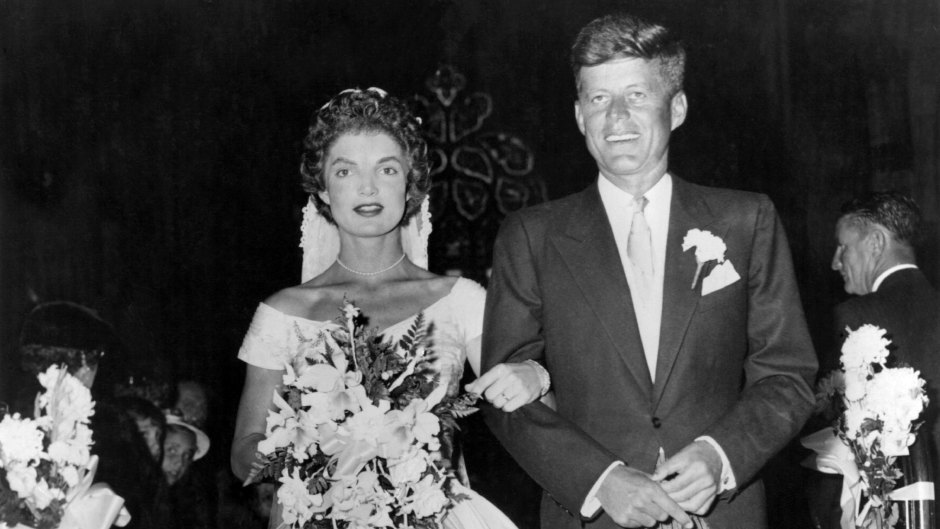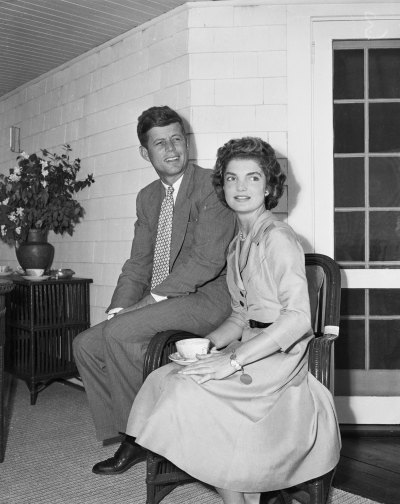
Keystone/Getty Images
Jackie Kennedy Onassis Almost Stood John F. Kennedy Up at the Altar: ‘She Disappeared’
As the festivities for her husband, President John F. Kennedy’s 45th birthday were being planned, first lady Jacqueline Kennedy faced a dilemma. Should she attend the gala at Madison Square Garden, featuring Marilyn Monroe singing “Happy Birthday?” In the end, Jackie, who had heard rumors of her husband’s alleged fling with the blonde bombshell, opted to avoid the sure-to-be humiliating event. Instead, she threw a cookout for her family at her retreat in Virginia and let JFK attend solo.
Nearly 30 years after her death, the life and secrets of Jacqueline Kennedy Onassis continue to fascinate. “Despite the money, power, celebrity and fame, people can really relate to her,” says J. Randy Taraborrelli, author of the new book Jackie: Public, Private, Secret. Although Jackie experienced many disappointments in love and marriage, she tried to learn from her mistakes.
Before she wed JFK, Jackie worried about his playboy reputation. In fact, she nearly canceled the wedding because of it. “The decision to marry JFK was really made by Jackie and her mom, Janet, who was a huge influence in her life,” explains the author. “Jackie’s mom, Janet, had a terrible marriage to Jackie’s father, Jack Bouvier, who was unfaithful. Janet didn’t want that for her daughter.”
How close did Jackie come to standing up JFK at the altar? Pretty close. “While everyone was preparing for the wedding, she sort of disappeared,” says Taraborrelli, who adds that Jackie eventually returned determined to make the best of her situation. “Her reservations were not unfounded, but it’s just that once the ball was rolling, it was hard to change the trajectory.”

Jackie learned to overlook her husband’s infidelity, but she nearly left JFK following the loss of their stillborn first child, a daughter she named Arabella, in 1956. “He was on a cruise, and when the stillbirth happened, he did not come home to be at her side,” relates Taraborrelli. Grieving and shocked by his callousness, Jackie confided to sister-in-law Ethel Kennedy that she was ready to begin divorce proceedings. “[Kennedy patriarch] Joe Kennedy went to Jackie and offered her $100,000 to stay in the marriage and have one child,” says the author, who notes that Jackie was a very practical person. “She took the deal because she felt she deserved it for being married to that man.” According to the book, after the birth of their daughter Caroline in 1957, Joe kept his end of the bargain and deposited the money (roughly equivalent to $1 million today) into Jackie’s bank account.
Yet, despite their many difficulties, there was also real love between Jackie and JFK. “He was the wrong guy for her, but she loved him so much,” says Taraborrelli. The birth of Caroline and John Jr. drew the couple closer, and the death of their last child, newborn Patrick, in 1963, caused JFK to regret the pain he’d caused his wife. “After Patrick died, JFK decided he was going to commit himself to his marriage,” says Taraborrelli. “Then, a couple of months later, he was murdered.”
The assassination of her brother-in-law Bobby Kennedy, in 1968, cemented Jackie’s resolve to marry Aristotle Onassis. The Greek shipping tycoon wasn’t just wealthy, he also had his own security force, which Jackie felt would keep her and her children safe.
However, their marriage, in October 1968, came with a number of understandings. “They were intimate one time, and it didn’t work for them, so they had an open marriage,” Taraborrelli reveals. “Jackie knew that Maria Callas was still going to be part of the picture.”
Onassis began his affair with the soprano opera star in 1957. During his marriage to Jackie, he continued to see Maria, who had left her husband for him, and to pay for her Paris apartment. He also forbade his wife from approaching Maria — but Jackie was curious. “She went to Maria’s home and sat across the street,” the secretary of Jackie’s Greek sister-in-law told Taraborrelli. “She said, ‘I saw [Maria] walking out of her building, this lonely-looking woman in a drab raincoat.’ She said she decided to leave the poor woman alone.”
After Onassis’ passing in 1975, Jackie moved back to New York full-time. She had first met businessman Maurice Tempelsman years earlier, in the 1950s. They became a couple, and he moved into Jackie’s apartment overlooking Central Park in 1982. “Maurice was her companion, not her lover,” writes Taraborrelli, who notes that the pair maintained separate bedrooms.
They also never wed. Marriage would have complicated their finances and their legacies to their children. And, according to the book, Maurice also realized that Jackie would never convert to Judaism for him. He never divorced his wife, Lily, but remained Jackie’s devoted companion until her death in 1994.
From the outside, Jackie’s relationships might seem unusual, but she always knew her mind. “Her mother taught her that she was unique and her own person,” says Taraborrelli. “With or without a man, Jackie always felt complete.”







































